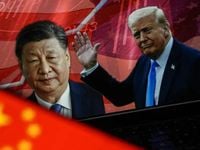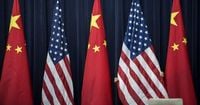The ongoing trade war between the United States and China is set to take a significant turn as U.S. Treasury Secretary Scott Bessent and chief trade negotiator Jamieson Greer prepare to meet with Chinese Vice Premier He Lifeng in Switzerland this weekend, specifically on May 10 and 11, 2025. This high-level meeting, announced by Washington on the evening of May 6, has already led to a positive response in the markets, with U.S. stock indices seeing an uptick and similar trends observed in China and Hong Kong during the Asian trading session.
These discussions come on the heels of escalating tensions that have seen tariffs on reciprocal imports exceed 100%, a situation Bessent has described as akin to a "trade embargo." The backdrop of these negotiations includes President Donald Trump's recent decision to impose extensive tariffs on imports from dozens of countries, which has disrupted supply chains, unsettled financial markets, and intensified fears of a severe global recession.
According to sources familiar with the planning, the agenda for the Geneva meetings will likely focus on reducing overall tariffs, as well as discussing specific product tariffs, export controls, and Trump's decision to eliminate exemptions for small-value imports. "I believe the goal is de-escalation," Bessent stated. "We need to reduce tensions before we can move forward."
A spokesperson for China’s Ministry of Commerce confirmed that Beijing agreed to resume discussions, marking the first high-level meeting between U.S. and Chinese officials since Senator Steve Daines' visit to Beijing in March 2025. This development follows a period where China had adopted a combative tone toward Washington, repeatedly stating it would not negotiate until the U.S. withdrew its tariffs. However, signaling a potential shift in strategy, the Chinese Ministry of Commerce announced on May 2 that it was evaluating an offer from the U.S. to initiate discussions.
During a press conference on May 7, Lin Jian, a spokesperson for the Chinese Foreign Ministry, reiterated that "China's position of firmly opposing the abuse of tariffs by the U.S. has not changed." The stakes are particularly high for China's economy, with the industrial sector already feeling the strain of the tariffs. Analysts have downgraded their economic growth forecasts for China in 2025, and the investment bank Nomura has warned that the trade war could result in the loss of up to 16 million jobs in the country.
In response to the economic challenges posed by these tariffs, the People's Bank of China announced a new monetary stimulus package on May 7, which includes interest rate cuts and liquidity injections into the banking system. Analysts view this move as a tactical response, aimed at stabilizing the economy ahead of the negotiations. "It is almost certainly a signal to the American government ahead of Saturday’s meeting," said Christopher Beddor, deputy research director for China at Gavekal Dragonomics. "The message is that Chinese officials are not panicking and are not negotiating from a position of weakness."
As the U.S. and China prepare for these crucial talks, the broader implications of the trade war continue to unfold. Since Trump announced a 10% tariff on most countries in early April, with additional tariffs set to increase starting July 9 unless bilateral agreements are reached, the economic landscape has shifted dramatically. Trump also imposed 25% tariffs on automobiles, steel, and aluminum, alongside a staggering 145% on Chinese imports, prompting retaliatory tariffs from China that have increased American product tariffs to 125%.
While the upcoming meetings aim to ease tensions, the substantive nature of the discussions remains uncertain. Bo Zhengyuan, a partner at the Shanghai-based consulting firm Plenum, noted, "For broader geopolitical negotiations to be feasible, tariffs must first be reduced. The key is whether both sides can agree on the level and scope of reductions, as well as the next steps."
Bessent has indicated that during the meeting, the two sides will decide on the specifics of what will be discussed. "We have a common interest—the current situation is not sustainable," he remarked. "Tariffs of 145% and 125% are equivalent to an embargo. We do not want decoupling; we want fair trade."
The Trump administration has sent mixed signals regarding the progress of negotiations with major economies eager to finalize agreements with Washington to avoid hefty import tariffs. Earlier, Bessent had informed Congress that the administration was negotiating with 17 key trading partners and could announce agreements with some of them within the week. Trump has also indicated that he and his team will review ongoing agreements to determine which ones will be accepted.
Amid these developments, a British official confirmed progress in discussions between the U.S. and the United Kingdom regarding a trade agreement. Bessent added that several countries, including Indonesia, have presented solid proposals to reduce tariffs and non-tariff barriers such as subsidies.
Despite the administration's efforts to reduce the trade deficit with tariffs, the approach has yielded counterproductive results thus far. In March, the trade deficit reached a record high due to massive imports by companies ahead of the new tariffs coming into effect. However, the trade deficit with China has significantly decreased, as Trump's tariffs have led to a sharp decline in imports from the country.
The upcoming meetings in Switzerland represent a critical juncture in U.S.-China relations, with both nations hoping to find common ground that could ease tensions and stabilize their economic futures. As the world watches closely, the outcomes of these discussions could have far-reaching implications for global trade dynamics.





